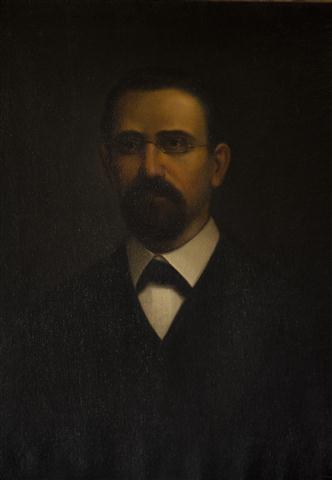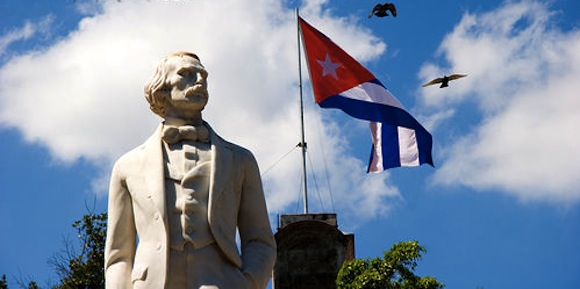Eusebio Leal Spengler ~ Historiador de la Ciudad de La Habana ~
The Most Precious Things That Any Man Can Possess: Humility and Wisdom
With your permission, Honorable Rector, distinguished personalities, rectors, professors, honorable civil and military authorities, honorable Ambassador of the Republic of Cuba, dear families and friends:
I would like to emphasize, embracing the word gratitude, – perhaps the most beautiful word in the language, expressed by my dear and admired friend, professor Dr. José Luis García Delgado, that it is a great honor that this ceremony allows me to join in his many merits and cover with them the scarcity of mine. My merits have been a life lesson; they are the fruits of an intellectual’s tireless labor, those of a man who knows that every idea must be solidly based, especially when it comes to worldly matters, – financial questions on which the tenet of utopia rests. Otherwise, such an idea would become a fantasy and there would be no
place for it to be considered.
I am pleased that it is at this university, – the beautiful and dear campus of Alicante, which reminds me of the ideal city imagined by Saint Augustine, – the beautiful city where harmony is based on wisdom, on a combination of talent, the pursuit of the raison d’être; and the praises of those things which should not be separated from beauty and the natural worship of every human kindness, even if they belong to science.
At this University, – that permanent institution of culture, on which the foundations of society have rested since the times when the earliest universities were organized and broke with the privilege of knowledge that used to be solely within the Church.
It then passed to the civil society assisted by the church, and Universities like ours were created on 5 January 1728, under the titles of Royal and Pontifical University of St. Jerome of Havana, – one of the last of the old universities, if we take into consideration the Spanish presence in the world I come from.
It was the vigil of the Epiphany and the city congratulated itself on establishing a university at the old convent of the Order of Friar Preachers, the same place where important and talented Dominican figures had once shined, including, amongst others, San Luis Beltrán.
I come from the Americas, – the Spanish Americas. I also come from the city that is always remembered and loved by those who know the history of relations emerging so long ago when in the early hours of October 1492, from the Atlantic balcony of Cuba, off the coast of today’s Holguín province, Christopher Columbus, under the flags of Castile and León, sighted land that he thought to be as similar and beautiful as that of Andalucía in the summer. All of this reminded him of that pleasant southern land, of a dream contained until that moment in the wise books of the ancients – mainly that of Marco Polo – who had visited Asia; or Piazzetta, or the great European travelers with whom he had shared his dream, a dream which crystallized not only during the starry nights at the Rabida, in Barra, Huelva, but also particularly, and very especially, in the active Santa Fe camp, where the Catholic Queen herself presented him with her powers to conquer the open seas, according to the dream leading a sailor – a descendant of Hasun – through the border of the known universe.
Thus the invention of the Americas emerged. The continent does not bear his name, not as a result of Américo Vespucio’s mean envy who, on the contrary, had great admiration for Columbus’ work, but rather because of the repetition of Américo’s name in the cartographies of that period. However, some centuries later, when Simón Bolívar, leader of the emancipation movement which shook that continent two hundred years ago, decided to draft his political and social work, called the continent Colombia, giving it back the name of its creator, as he put it.
We are the sons and daughters of transatlantic Spain’s dream. We return as ancient knights still wearing the cape and as proud as those founders who, variegated in their steel armors, destroyed a world, it is true, only to found a new one, on the ruins of pyramids and gods. Thus the encounter between the Americas and Spain began. An encounter with many Spains, as imagined by that passionate poet who described Spain’s dreams in those lines that I still remember and repeatedly quote: “…poured into you by one hundred peoples, from Algeciras to Istanbul, so you can paint in blue their long winter nights.”
I have come to Valencian land, which is of great importance for Cubans, because it was on Cordelet Street, in Valencia, that Mr. Mariano Martí Navarro, the father of Cuba’s independence apostle, was born. He was the father of a passionate and intense poet, a liberator, the one who wrote the Spanish language like few people did, who was praised by the great writers of his time and whose prominence remains intact where the Americas and Spain have placed him. “I grow a white rose, in June as in January”, as one of his verses read, or that other passionate line that one can feel in the aforementioned University of Saragossa, where he shared exile and education: “That land of flowers I love, in truth,
where mingles Moor and Spaniard’s blood,
for there my life emerged from bud
as manhood formed from eager youth.”
And I am also in a Muslim or Spanish land. The first time I returned, or rather came to, this land I looked for Cordelet street, in that place where esparto grass weavers had welcomed that lively boy from Cuba who would become, as I said before, the privileged apostle of its history.
Valencia has opened its doors to me through dear friends represented in the audience. I shall not mention them all though. I will rather choose two: one who lives no more, there in his Ontinyent land – Mr. Manuel Revert Nadal, who contributed the first art history to my work when we were poor and barefoot, I will never forget him; – and Mr. Alfredo Peretó Comins, from Alzira, Valencia, someone who took part in the preparation of the Fallas, and who taught me the beauties of the Valencia I did not know, under the fire of that land, where apparently the most important thing is to look at the illuminated sky.
And to this land I have returned, as amazed as the day when I was called by Mr. Andrés Pedreño. Following the wonderful sign that Professor Louis designed, I was able to reach this beautiful campus that I earlier compared to the ideal city of the bishop of Hippo.
I came to the University where I found dear friends. First, I met Rector Andrés Pedreño, who sang the praises of Mr. José Luis García Delgado. I appreciate his kindness in welcoming me here so many years ago. In particular, I would also like to thank Mrs. Margarita Mazzela, and especially Mrs. Begoña San Miguel. The two of them were not only managers of a project; they also gave and received love – the saving force on which everything is founded and regenerated.
Hence, I have come as a messenger from that land of ours, which was determined to create its own destiny since the naval battle of 3 July 1898. Two hundred years ago, the vine shoots from which a handful of nations were founded, came off the tall and robust blooming trunk of historic Spain. I come from that land where Martín, the son of Martín Hernán Cortés, was born out of one of the earliest love stories with the native Indian woman who served as his translator and dream confessor – Mrs. María. But rather I come from Sister Juana Inés de la Cruz, the first poetic inspiration in our continent. I come from Inca Garcilaso de la Vega, who was born out of Garcilaso’s love for an Incaic princess. I come from Santa Rosa de Lima and the first American saint – San Martín de Porres, who opened his way to heaven, frightening mice away with a broom. I come from the Americas, not so much from those conquering battleships of years gone by, but from the emigrants arriving later.
Every home in my country is governed, either at the table or from the grave, by one of those who made their way in search of a better way of life. They left Spain in poverty, during years of crisis – unforeseen and unimaginable crisis, in those years when the young generation of intellectuals was struggling to overcome the disaster of lost colonies. Of those left, after the failed Battle of Annual, after Morocco’s disaster, many fled from military service and went into the Cuban hills. Strong woodcutters from Oviedo and Asturias mountains worked the land, like woodcutters from Baracoa. Galician sailors opened the seas; men from the Canary Islands worked the land in Pinar del Río to grow tobacco. They became our parents and grandparents. We carry their names and last names. We communicate in their language – the most important legacy from Spain to the world and the Americas. We take pride in that beautiful language in which the purest classical writers expressed themselves – the language of Cervantes and Teresa de Ávila, and if I first recalled José Martí in his “I grow a white rose…” behind me I feel the saint repeating: “I live but do not live within
and such a higher life await …” Thank you for inviting me to Alicante and for so many memories.
I see many friends in the audience. José Luis has mentioned our frequent meetings in Oviedo after I left Magdalena, taking that gentle road that goes through Santillana, leading to Cabezón de la Sal, hastily crossing San Vicente de la Barquera bridge to enter Unquera and seeing the height of the Mountains of Europe, where the first road embraced the Christian faith to make its way to the south of Spain and nurture hope.
I come from Cuba, a country struggling, like I said, to find its destiny. I very much appreciate, without any conceit, the title you have conferred on me. I must tell you something important. We have listened to the praises and response address by an illustrious academic, yet I was a self-taught person, born into poverty, and could hardly conclude my primary education. My venerable centenarian mother, who is in Cuba, expects these words. Thanks to her I was able to break through, then I was admitted to the University on condition of “aptitude and defense of each and every subject.” Those were immense struggles; nights, weeks and years looking for what is hidden in the book you have presented me with at the oath ceremony, to find the most precious things that any man can possess: humility and wisdom.
Thank you very much.
Compartir


